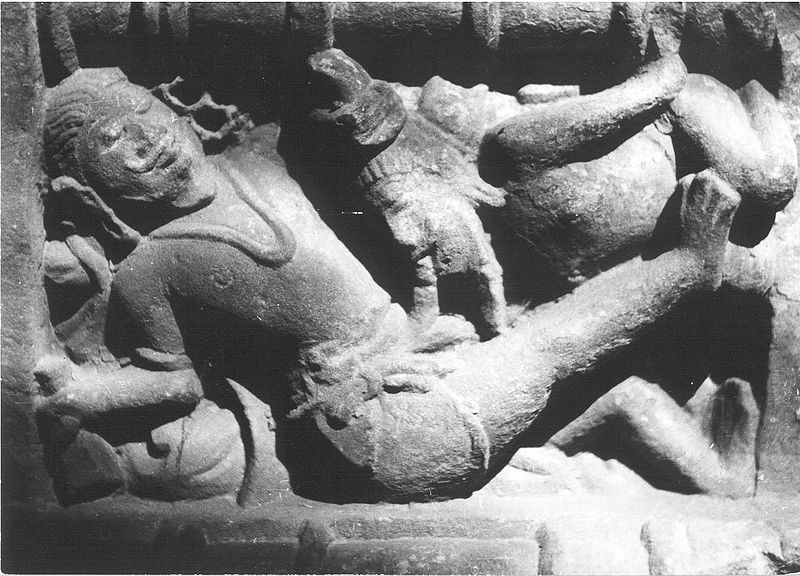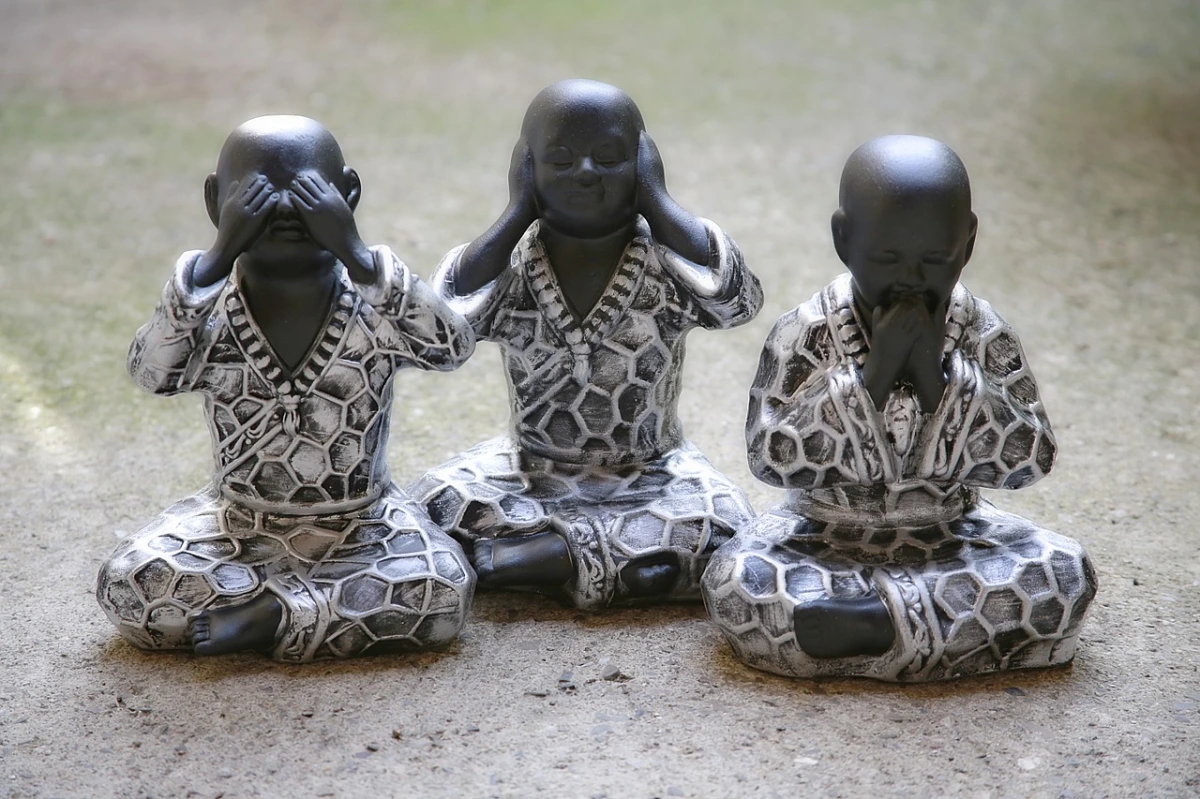Masturbation And Religion - Exploring Religious Perspectives
In this comprehensive exploration, we delve into the diverse viewpoints on masturbation and religion, across various practices, shedding light on the intersection of religious teachings and human sexuality.
Bernard HorneOct 18, 202384 Shares13966 Views

Masturbation, a natural and common human experience, has long been a topic of interest within religious contexts. People often seek guidance from their faithon matters related to sexuality, including masturbation. In this comprehensive exploration, we delve into the diverse viewpoints on masturbation and religion, across various practices, shedding light on the intersection of religious teachings and human sexuality.
Embracing Masturbation - A Natural Aspect Of Human Sexuality
Before exploring the intricate tapestry of religious viewpoints on masturbation, it is paramount to acknowledge the fundamental truth: masturbation is a natural and intrinsic aspect of human sexuality. Across diverse cultures, spanning various ages and backgrounds, individuals engage in this intimate act. Medical professionals, experts in the field of human healthand development, universally recognize masturbation as a standard and healthy expression of one's sexual identity.
Universal Practice And Cultural Variations
Masturbation is not confined by geographical borders or cultural boundaries. People from every corner of the globe, irrespective of their cultural heritage, engage in this private yet natural act. It transcends societal norms and customs, resonating universally as a common human experience. Regardless of language, ethnicity, or religious belief, individuals of all walks of lifefind solace and satisfaction in the deeply personal realm of masturbation.
Supported By Medical Expertise
The affirmation of masturbation as a natural and healthy expression of human sexuality finds robust support within the medical community. Physicians, psychologists, and sexual health experts concur that masturbation is an integral part of human sexual development. It serves as a vital means through which individuals explore their bodies, comprehend their desires, and establish a sense of bodily autonomy. This self-exploration fosters a positive understanding of oneself and nurtures a healthy body image, contributing significantly to overall well-being.
Promoting Self-Discovery And Body Positivity
Masturbation plays a pivotal role in the journey of self-discovery and self-acceptance. It empowers individuals to understand their own desires and preferences, promoting a healthy relationship with their bodies. In a world where body positivity and self-love are increasingly championed, masturbation stands as a natural ally in this journey towards self-acceptance. It encourages individuals to embrace their bodies, fostering a sense of confidence and self-assurance.
Christianity - A Spectrum Of Moral Interpretations
Christianity, as a multifaceted faith, encapsulates a wide spectrum of perspectives on masturbation. Within the Christiancommunity, interpretations concerning this intimate act diverge significantly, shaping the beliefs and practices of its followers. The diversity of these interpretations mirrors the intricate tapestry of Christian thought and tradition.
Conservative Views And Scriptural References
Some denominations within Christianityespouse conservative views on masturbation, drawing upon specific passages from religious texts to substantiate their stance. These interpretations often point to scriptures that highlight the importance of self-control and condemn lustful desires. From this perspective, masturbation is perceived as a sinful indulgence, contrary to the principles of moral purity outlined in the Bible.
Emphasis On Personal Conscience And Scriptural Silence
Contrastingly, there are Christian groups that emphasize the autonomy of personal conscience within the bounds of faith.
These believers argue that the Bibledoes not explicitly condemn masturbation, leading them to adopt a more permissive attitude. They maintain that the absence of direct prohibition implies a degree of personal freedom in matters of sexual expression. This perspective underscores the nuanced and evolving nature of ethical considerations within Christianity.
Navigating Complexity
The varying viewpoints within Christianity regarding masturbation underline the complexity inherent in interpreting religious teachings. The disagreements among believers reflect the multifaceted nature of the faith, where individuals and communities grapple with integrating ancient scriptures into contemporary lives. As a result, discussions around masturbation within Christian circles are often intricate, reflecting a broader dialogue within the faith about the intersection of spirituality, human nature, and sexual ethics.
Theological Reflections And Ongoing Dialogue
In the face of this diversity, theologians and scholars engage in ongoing dialogue, delving deep into the scriptures and historical context to derive nuanced understandings. These discussions often involve interpreting ancient texts through a modern lens, taking into account cultural shifts, scientific advancements, and evolving societal norms. Theologians strive to bridge the gap between tradition and contemporary realities, fostering a more comprehensive understanding of how Christian teachings intersect with the complexities of human sexuality.
Islam - A Tapestry Of Diverse Interpretations
Within the vast tapestry of Islamic beliefs, perspectives on masturbation form a complex and multifaceted landscape. Scholars and followers alike engage in nuanced discussions, resulting in a diverse array of opinions. This diversity reflects the richness of Islamic thought and the intricate interplay between religious doctrine and human sexuality.
Varied Scholarly Opinions
Islamic scholars, renowned for their deep understanding of religious texts and traditions, hold varying opinions on the topic of masturbation. Some scholars contend that masturbation is haram, categorizing it as forbidden in Islam due to its perceived violation of modesty and self-restraint. Others adopt a more lenient perspective, arguing that under specific circumstances, such as the prevention of adulteryor within the confines of marriage, masturbation might be permissible. These differing scholarly viewpoints highlight the interpretative flexibility within Islamic jurisprudence.
Cultural Factors And Religious Schools Of Thought
The diversity in Islamic perspectives on masturbation is also intricately woven with cultural influences and different schools of thought within the religion. Cultural norms and traditions often shape the way individuals and communities perceive and interpret religious teachings. Additionally, various Islamic sects and schools of jurisprudence contribute to the spectrum of beliefs surrounding masturbation. The interplay between cultural contexts and religious doctrines creates a rich tapestry of beliefs and practices among Muslims worldwide.
The Role Of Context And Individual Belief
Understanding the nuances of Islamic perspectives on masturbation requires a recognition of the significance of context and individual belief. Muslims, guided by their personal convictions and the teachings of their religious leaders, navigate these interpretations within the framework of their daily lives. The diverse range of beliefs within the Islamic community underscores the importance of personal conscience and the ability to make informed decisions in alignment with one's faith.
Judaism - Bridging Tradition And Modernity
In the realm of Judaism, the topic of masturbation is intricately interwoven with both traditional teachings and contemporary discourse, exemplifying the dynamic nature of religious thought within the Jewish community. Traditional interpretations, rooted deeply in ancient texts and religious doctrines, generally discourage the practice of masturbation, especially outside the sacred context of marital relations. This perspective is informed by historical interpretations of Jewish law and moral ethics.
Navigating Ancient Texts And Modern Realities
However, the Jewish faith, like many other religions, recognizes the need to adapt and engage with the evolving realities of the modern world. Contemporary Jewish scholars actively participate in ongoing discussions that delve into the intersection of ancient religious texts and the nuanced understanding of human sexuality in the present day. These scholars carefully dissect centuries-old scriptures, seeking relevance and applicability within the context of contemporary life.
The Complexity Of Modern Discussions
The dynamic conversation among modern Jewish scholars is a testament to the complexity of the issue. It involves grappling with ancient texts, often written in vastly different cultural and societal contexts, and reconciling them with the diverse range of human experiences and expressions of sexuality seen today. This process demands a delicate balance between preserving the sanctity of tradition and addressing the realities of the modern world, where discussions around sexual health, consent, and personal autonomy are prominent.
Embracing Evolution: Reflecting The Evolving Jewish Community
The ongoing discourse within the Jewish community regarding masturbation mirrors the broader evolution of beliefs and practices within Judaism. It showcases the willingness of the faith to engage with contemporary challenges and questions, adapting its teachings to resonate with the lives of its followers. This adaptability is a hallmark of Judaism's strength, allowing it to remain relevant and meaningful across generations.
Hinduism - The Path Of Balance And Respect For Human Nature
In the tapestry of Hinduism, a religion known for its richness and diversity, the topic of masturbation is approached with a perspective deeply rooted in balance, moderation, and respect for human nature. Unlike some other religious traditions, Hinduism does not provide explicit guidelines regarding masturbation, allowing individuals the freedom to interpret this aspect of human sexuality within the broader framework of the faith.
Absence Of Explicit Guidelines
One of the unique aspects of Hinduism is its silence on specific sexual practices such as masturbation. This silence can be seen as an invitation for practitioners to exercise personal responsibility and discernment. In the absence of rigid rules, individuals are encouraged to navigate their sexual experiences in a manner that aligns with the principles of balance (known as 'dharma') and moderation advocated by the religion.
The Essence Of Balance
Central to Hindu teachings is the concept of balance. Hinduism emphasizes the importance of striking a harmonious chord between various aspects of life, including physical desires and spiritual pursuits. Masturbation, like other forms of sexual expression, is regarded as a natural human experience, one that is neither glorified nor condemned. Instead, it is seen as a part of the broader spectrum of human existence, subject to the individual's discretion.
Self-Control And Moderation
Within the Hindu community, diverse perspectives exist regarding masturbation. Some practitioners choose to emphasize self-control and restraint, aligning their choices with ascetic traditions within Hinduism. For them, moderation is key, ensuring that natural desires are acknowledged and respected without leading to excess. Others view masturbation as a natural release of sexual energy, provided it does not transform into a harmful or obsessive behavior.
Embracing The Natural
In essence, Hinduism's approach to masturbation reflects a holistic understanding of human nature. It acknowledges the natural instincts and desires that are inherent to human beings, advocating for a balanced approach that respects both the physical and spiritual dimensions of life. By embracing the natural aspects of human sexuality within the boundaries of moderation, Hinduism encourages individuals to lead fulfilling lives while upholding the core values of the faith.
Buddhism - The Path To Mindful Self-Regulation
In the serene realms of Buddhism, where mindfulness and self-awareness are cherished virtues, the concept of masturbation finds itself approached with a unique blend of wisdom and restraint. While Buddhism does not offer explicit teachings on masturbation, its core principles provide followers with a thoughtful framework for understanding and regulating their desires.
Mindfulness And Desire
Central to Buddhism is the practice of mindfulness, a state of active, open attention to the present moment. In the context of desires, including sexual ones, mindfulness invites individuals to be acutely aware of their emotions and impulses. By cultivating this heightened awareness, followers can discern the origin and nature of their desires, allowing them to respond thoughtfully rather than succumbing to impulsive actions.
Self-Control
In Buddhist philosophy, self-control is regarded as a formidable virtue. The emphasis lies not in suppressing desires but in understanding and managing them with wisdom and discipline. Masturbation, being a pleasurable and natural impulse, is neither condemned nor glorified within Buddhism. Instead, followers are encouraged to exercise self-control and moderation in all aspects of life, including sexual experiences.
The Principle Of Moderation
The discouragement of excessive indulgence, whether in sexual activitiesor any other form of pleasure, resonates deeply with the Buddhist principle of moderation. Buddhism advocates for a balanced approach to life, wherein desires are acknowledged but not allowed to overpower one's sense of mindfulness and self-discipline. Masturbation, viewed within this lens, should be a mindful act, devoid of obsession or compulsion, and conducted in moderation.
The Path To Enlightenment
Buddhism, at its core, is a path toward enlightenment – a journey marked by self-awareness, compassion, and the harmonization of desires. In this context, the approach to masturbation becomes not just a matter of physicality but a reflection of one's inner state. By practicing mindful awareness and self-control, individuals embark on a transformative journey where desires are acknowledged, observed, and regulated, leading to a deeper understanding of the self and the world.
Respectful Masturbation Across Religions
Masturbation, a natural and healthy aspect of human sexuality, is a topic that often carries diverse interpretations and opinions across different religious traditions. Understanding and respecting individual beliefs while promoting self-care and well-being is essential. In this spirit, we explore the concept of respectful masturbation in the context of various religions, encouraging a compassionate approach to this personal practice.
Respectful Masturbation In Christianity
Christianity's perspectives on masturbation vary widely. While some denominations emphasize self-control, others advocate for understanding personal conscience within the context of faith. Respecting individual beliefs and embracing self-care is key, fostering a compassionate approach within the Christian community.
Respectful Masturbation In Islam
Islamic perspectives on masturbation are influenced by cultural factors and different schools of thought. While some consider it permissible under specific circumstances, others may hold stricter views. Acknowledging these differences with respect and understanding is crucial, promoting a tolerant dialogue within the Muslim community.
Respectful Masturbation In Judaism
Judaism's teachings emphasize the importance of marital relations. While traditional interpretations discourage masturbation outside marriage, contemporary discussions within the Jewish community explore nuanced understandings. Encouraging open conversations that bridge tradition and modern realities fosters a respectful environment for all believers.
Respectful Masturbation In Hinduism And Buddhism
Hinduism emphasizes balance in all aspects of life, including sexuality. Similarly, Buddhism promotes mindfulness and self-awareness. Both traditions acknowledge natural desires while advocating for moderation and mindful self-control. Understanding these principles encourages respectful attitudes towards masturbation within these faiths.
In respecting diverse religious beliefs, it is important to also consider the physical aspects of self-care. For those seeking appropriate products to enhance their self-care routines, Bernardine offers valuable insights and recommendations. By nurturing understanding, compassion, and respectful dialogue, we can create a more inclusive and accepting environment for individuals of all faiths, fostering a sense of unity amidst diversity.
Religion And Masturbation - FAQs
What Does The Bible Say About Self Pleasure?
The Bible's stance on self-pleasure, or masturbation, isn't explicitly mentioned. Interpretations vary widely within different Christian denominations:
- The Bible does not specifically address masturbation.
- Interpretations vary among scholars and denominations.
- Some argue against it based on passages about self-control and sexual purity.
Is It A Sin To Waste Sperm?
The concept of wasting sperm is rooted in traditional interpretations of religious texts, leading to diverse perspectives:
- Traditional interpretations in Judaism and some Christian contexts consider wasting sperm as a misuse of the reproductive act.
- Derived from texts emphasizing procreation and the sanctity of life.
- Views on this issue differ widely among individuals and religious communities.
Why Not To Drink Sperm?
Religiously, there are no explicit prohibitions, but health concerns are pertinent in this context:
- Major religions do not specifically forbid drinking sperm.
- From a health perspective, consuming bodily fluids can pose risks, including infection transmission.
- Emphasizes the importance of prioritizing one's well-being and adhering to safe practices.
Is It Good To Release Sperm Daily?
The frequency of releasing sperm is a personal choice, influenced by various factors:
- Releasing sperm is a personal decision and varies based on individual preferences and circumstances.
- There's no religious mandate specifying how often one should release sperm.
- Regular ejaculation is considered healthy for the reproductive system, but what's "good" depends on individual needs and beliefs.
Conclusion
The diversity of opinions on masturbation across religions underscores the complexity of human sexuality and the ways in which faith is interpreted and practiced. Individuals seeking guidance within their religious beliefs often find themselves navigating a nuanced landscape, where ancient teachings intersect with modern understandings of human nature.
In conclusion, the discussion surrounding masturbation and religion highlights the ongoing dialogue between faith, personal beliefs, and human experiences. As societies evolve, these conversations will likely continue, shaping the ways in which individuals reconcile their faith with their natural inclinations and desires. Ultimately, understanding and acceptance within religious communities will play a pivotal role in fostering a healthy approach to human sexuality.
Jump to
Embracing Masturbation - A Natural Aspect Of Human Sexuality
Christianity - A Spectrum Of Moral Interpretations
Islam - A Tapestry Of Diverse Interpretations
Judaism - Bridging Tradition And Modernity
Hinduism - The Path Of Balance And Respect For Human Nature
Buddhism - The Path To Mindful Self-Regulation
Respectful Masturbation Across Religions
Religion And Masturbation - FAQs
Conclusion
Latest Articles
Popular Articles




